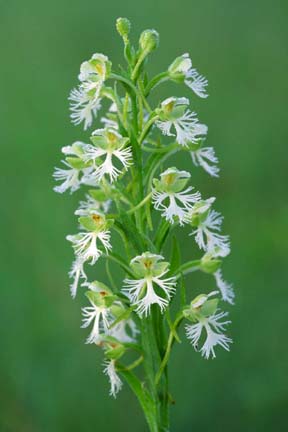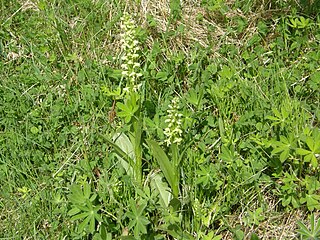
Platanthera praeclara, known as the western prairie fringed orchid and the Great Plains white fringed orchid, is a rare and threatened species of orchid native to North America.

Platanthera leucophaea, commonly known as the prairie white fringed orchid or eastern prairie fringed orchid, is a rare species of orchid native to North America. It is a federally threatened species, protected since October 30, 1989 under the Endangered Species Act of 1973. In Canada, it has been listed endangered under Schedule 1 of the Species at Risk Act since 2005. In 2014, the International Union for Conservation of Nature assessed it as "least concern."

The genus Platanthera belongs to the subfamily Orchidoideae of the family Orchidaceae, and comprises about 150 species of orchids. The members of this genus, known as the butterfly orchids or fringed orchids, were previously included in the genus Orchis, which is a close relative. They are distributed throughout the temperate regions of the Northern Hemisphere. They are terrestrial and have tubercules.

Platanthera chlorantha, commonly known as greater butterfly-orchid, is a species of orchid in the genus Platanthera. It can be found throughout Europe and Morocco. The name Platanthera is derived from Greek, meaning "broad anthers", while the species name, chlorantha, means "green-flowered".

Platanthera blephariglottis, commonly known as the white fringed orchid or white-fringed orchis, is a species of orchid of the genus Platanthera. It is considered to be an endangered species in Connecticut and Ohio, a threatened species in Florida, Maryland and Rhode Island, exploitably vulnerable in New York, and susceptible to be threatened in Québec.

Platanthera elegans is a species of orchid known by several common names, including elegant piperia, coast piperia, hillside rein orchid, and hillside bogorchid. This is a showy flowering plant native to western North America. It grows from a caudex tuber and sends up a thick stem just under a meter in maximum height. The stem is topped with a cylindrical spike inflorescence of densely packed flowers with curving white to greenish-yellow petals. Coastal individuals are noticeably thicker and have more flowers than those that grow further inland; it is uncertain if these are variants, subspecies, or even separate species. They are both currently treated as P. elegans. Other species of Plantanthera, notably the endangered species P. yadonii are quite similar in appearance to some populations of this species.

Platanthera psycodes, commonly called lesser purple fringed orchid or small purple-fringed orchid, is a species of orchid, genus Platanthera, occurring from eastern Canada to the east-central and northeastern United States. It is imperiled in Illinois, Tennessee, North Carolina, and Kentucky.

Platanthera michaelii is an uncommon species of orchid known by the common names Michael's rein orchid and Michael's piperia. It is endemic to California, where it is known from the coastal plains, hills, and mountains, and the Sierra Nevada foothills. It can be found in varied habitat, including scrub, woodland, and forest. This orchid grows erect to about 70 centimeters in maximum height from a bulbous caudex. The basal leaves are up to 24 centimeters long by 5 wide. Leaves higher on the stem are much reduced. The upper part of the stem is a spikelike inflorescence of many yellow-green flowers which are fragrant in the evenings.

Platanthera hyperborea, the northern green orchid, is small orchid found only in Greenland, Iceland, and Akimiski Island in Canada. Numerous authors cite the species as widespread in other parts of Canada and also in the United States; such populations are more correctly referred to as Platanthera aquilonis.

Platanthera obtusata, common name blunt-leaved orchid or small northern bog orchid, is a small species of orchid in the genus Platanthera. It widespread across much of the colder regions of the Northern Hemisphere, though rare in some parts of its range. Two subspecies are recognized:

Platanthera flava, the palegreen orchid, is a species of pale-flowered orchid. It is native to eastern North America, from Texas east to Florida, north to Ontario, Quebec and Nova Scotia.

Platanthera orbiculata, the round leaved orchid or lesser roundleaved orchid, is a species of orchid native to forested areas of North America. It is widespread across most of Canada and parts of the United States.

Platanthera peramoena, the purple fringeless orchid, is a species of flowering plant in the orchid family. It is native to the Eastern United States, where it is found from the Mid-Atlantic states, the Ohio Valley and the Ozark Mountains. Its natural habitat is moist forests, marshes, and on streambanks.

Platanthera nivea, commonly called the snowy orchid, is an orchid species of native to the Southeastern United States. Its range is almost entirely restricted to the southeastern Coastal Plain, with a few notable inland populations such as in Coffee County, Tennessee. Within this range, it is found in wet savannas and bogs.

Platanthera dilatata, known as tall white bog orchid, bog candle, or boreal bog orchid is a species of orchid, a flowering plant in the family Orchidaceae, native to North America. It was first formally described in 1813 by Frederick Traugott Pursh as Orchis dilatata.

Platanthera integrilabia, commonly called white fringeless orchid, is a species of flowering plant in the orchid family (Orchidaceae). It is native to the Southeastern United States. Its natural habitat is in boggy acidic seeps and flats, usually in partial open sunlight.

Platanthera purpurascens, the purple petal bog orchid, is a terrestrial orchid of North America.

Platanthera aquilonis, the northern green orchid or north wind bog orchid, is a species of self-fertilizing orchid native to the United States and Canada with a widespread distribution across the two countries.

Platanthera tipuloides, the Aleutian Bog Orchid or Bering Bog Orchid, is a terrestrial orchid native to the United States, Russia, China, Japan and Korea.

Platanthera chorisiana, Chamisso's orchid or Choris' bog orchid, is a terrestrial orchid native to the United States, Canada, Russia and Japan.





















